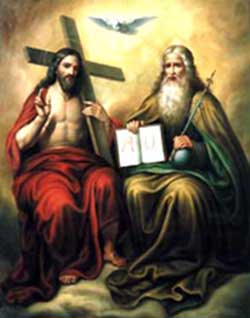Genesis 1:26-27 reads:
Then God said, ‘Let US make humankind in our image, according to our likeness; and let them have dominion over the fish of the sea, and over the birds of the air, and over the cattle, and over all the wild animals of the earth, and over every creeping thing that creeps upon the earth.’
So God created humankind in his image,
in the image of God he created them;
male and female he created them.
And Genesis 3:22 reads:
Then the Lord God said, ‘See, the man has become like one of US
There’s a lot of eisegesis (“the process of interpreting a text or portion of text in such a way that the process introduces one’s own presuppositions, agendas, or biases into and onto the text”) about the plural for God in Genesis. The first quote, above, is particularly popular currently as a prooftext in sexuality debates.
Christians have traditionally seen this verse as adumbrating the Trinity. It is now universally admitted that this was not what the plural meant to the original author. Gordon J. Wenham in Word Biblical Commentary, Vol. 1: Genesis 1-15
(page 27).
 Furthermore, I have great empathy for those who wonder why the eisegesis of this text leads from a general imaging of two men and a bird to only a male and a female can live in a committed relationship.
Furthermore, I have great empathy for those who wonder why the eisegesis of this text leads from a general imaging of two men and a bird to only a male and a female can live in a committed relationship.
It is certainly of interest that the plural for the deity is present in both creation accounts (P and J). Although the issue is obviously more complex than a brief blog post, to keep it simple, the honest reading of these texts leads to an interpretation that the author(s) had a monolatrous understanding.
The earlier layers of the Bible evidence not monotheism (as we would now understand this) but monolatry, “the recognition of the existence of many gods, but with the consistent worship of only one deity”. Once one recognises monolatry as the approach in early layers of the Bible, a lot of other texts suddenly make much more sense (eg. Psalm 82; even the ten commandments).




I hope I remember this correctly since I’m writing off the cuff:
I came across a Midrash yonks ago where this was explained. The Midrash said the Hebrew “naaseh” (let US make) is according to the plural ending of “elohim”, the word for God used in this passage of Genesis.
Yes, Eva. Again, to keep it simple, Elohim is a plural word, regularly translated as “gods”. Blessings.
Isn’t this used one more time, in the story of the Tower of Babel?
“Come, let us go down…”
And then never appears again?
Maybe that is correct, Br David, about a construct that we translate into English as “let us”, but the monolatrous concept continues, as I indicated. Blessings.
Perfect timing as my Year One students and I will be talking about the Priestly creation story in Education for Ministry tonight. I like starting off the year by blowing everyone’s minds (I.e. that monolatry is how it all began).
Great, Jonathan. I also recommend reading sometime The Lost World of Genesis One which contends that Genesis 1 is not about creation, as we understand it, at all. That book dovetails well into an approach which sees it poetically with three “days” of “making” followed by three of “filling”. Blessings.
Genesis is fascinating. And, as you point out, the monolatry does not end there. I must admit I had never ‘read’ the 10 Commandments through that lens. It makes me want to get my EFM notes out again. Thanks for another stimulating post.
«And this spake he [Caiaphas] not of himself: but being high priest that year, he prophesied that Jesus should die for that nation» (John 11:15).
Like Caiaphas, many were inspired in the Old Testament, although they were not aware at all about the deep meaning of what they were writing.
It is clear that there was a monolatry in the OT before they rose up to monotheism. But God inspired them to write, beyond their understanding, about the triunity of God, about Jesus’ redemption, about Jesus’ resurrection etc.
Nevertheless, the plural in Elohim while the singular in the verbs like «bara» is something. And explaining it by the “majesty use” argument is another isegesis.
“But God inspired them to write, beyond their understanding, about the triunity of God, about Jesus’ redemption, about Jesus’ resurrection etc.”
At least you and many others have read that back into those writings that you think pertain to those topics. That to me does violence to those texts.
It would make them violence, if they haven’t been inspired. But, as there is also another author than the human one, we shouldn’t only see what the human wished to say.
The author of the John gospel also makes violence to Caiapha’s words, lest those be inspired by God.
The violence is committed, Georges, when you or anyone else pretend that you know a deeper meaning behind what the author or the editor has written. Especially when you proceed to adversely effect the lives of others as you try to force what you believe is being said on the rest of us.